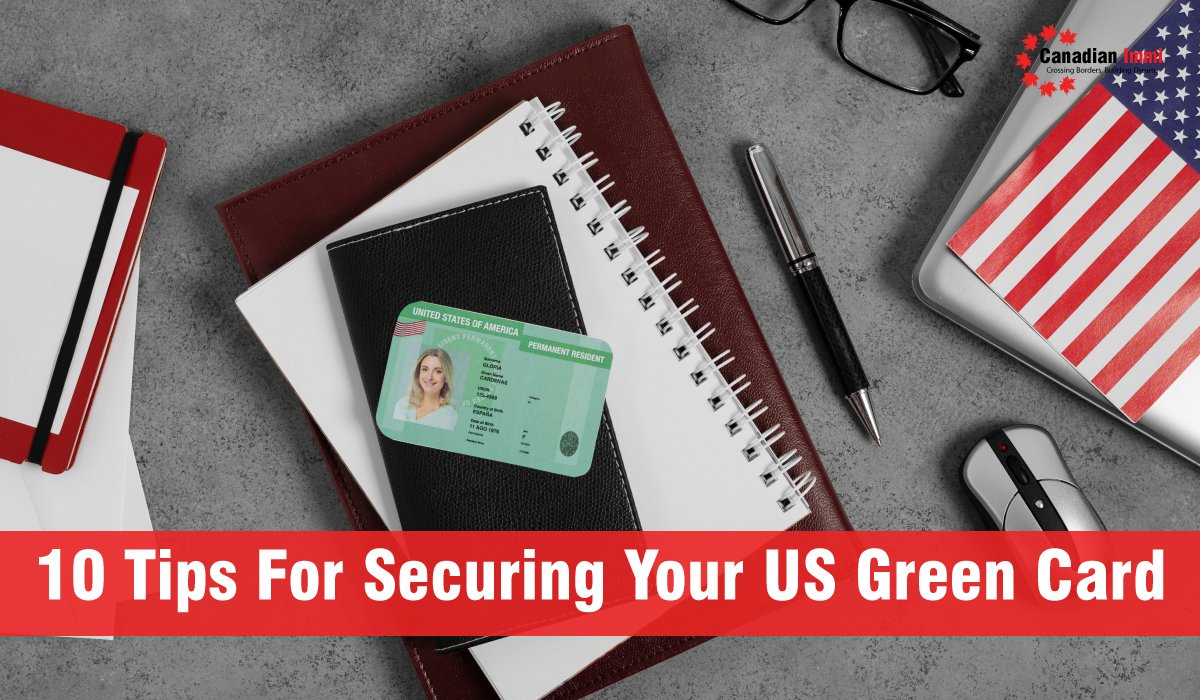10 Tips For Securing Your US Green Card
1. Know the Rules
A Green Card, also known as a Permanent Resident Card or Lawful Permanent Residence Card, is an identity document that allows its holders to live and work permanently in the United States. It is issued by USCIS.
There are several categories of Green Cards, and the steps you must take to get one will depend on your immigration situation. You can find more information about each category at the official USCIS website.
For example, employment-sponsored Green Cards are granted to foreign workers who have been sponsored by an employer in the United States. Family-based Green Cards are granted to close relatives of US citizens. Refugee and asylee Green Cards are given to people who have been persecuted in their home country for reasons such as race, religion, nationality, political opinion, or membership in a social group.
2. Be Prepared
The Green Card is an official document that allows you to live and work legally in the United States as a lawful permanent resident. It must be renewed every 10 years. You may be fined or jailed if you are caught without it. You also have responsibilities as a Green Card holder, including filing income tax returns and reporting any changes to USCIS.
USCIS recently redesignated the green card, restoring its original color and introducing tamper-resistant security features. The new card contains detailed holograms and other features to prevent counterfeiting. If you are applying for a marriage-based green card, the immigration officer will ask questions about your relationship. It is important to prepare answers ahead of time, so you are ready to answer honestly and clearly. The interview may also include questions about travel, daily activities, and other details of your marriage.
3. Be Honest
During your green card process, you and your spouse will be required to answer many questions. You must be honest and provide consistent answers for all of the forms. You should also be prepared to provide documentation for any information you may be asked to give.
The green card, which regained its color in 2010 after USCIS introduced one of the most fraud-resistant cards on the market, is a key piece of evidence that you are a permanent resident of the United States. It allows you to work, travel, and petition for close family members to become permanent residents as well.
However, the green card does not protect you from deportation if you are convicted of certain crimes. For this reason, it is important to avoid any criminal activities that could put your immigration status at risk.
4. Be Organized
Green card holders are legal permanent residents of the United States. They can live and work in the United States, as well as qualify for citizenship after three or five years. They are also entitled to the same protections of the law as U.S citizens. However, they must follow certain responsibilities and obligations as a resident, such as filing income tax returns. They are also eligible to participate in politics, from local elections to the presidential race, by making financial contributions and/or volunteering for a campaign.
Family members of current green card holders are given priority, but they must wait until their spouse or children reach the age of 21 to sponsor them. Similarly, if you are a corporate transferee—think Toyota sending its Tokyo manager to New York—your employer must petition for you.

5. Be Flexible
Flexibility is a trait that helps you adapt to change. It can help you overcome obstacles, achieve your goals, and be a more effective leader. Being flexible can also help you make more informed choices.
Being a lawful permanent resident means you have certain rights and privileges. However, you need to take the right steps to ensure that you retain this status. Many people lose their green card each year due to unplanned events, such as caring for a sick family member or returning to work in their home country.
You can secure your green card by getting a job in the US through a Labor Certification or an EB-2 visa. Or you can bring your spouse, parents, children, and siblings to the United States as a family-based green card holder. In either case, the process can be long and complicated.
6. Be Prepared for the Interview
The Green Card is a permanent resident visa that confers the right to live and work in the United States. It is typically awarded to individuals who have exceptional skills or talents, a job in the US, American family members, or refugee status.
Applicants must complete multiple forms for their immigration journey. For example, they must submit personal information and answers to questions about their background. They must also provide fingerprints and photos.
Upon approval, they will receive a photo identity card that is, literally, green. They can then begin the process of becoming a naturalized citizen. They can also petition for certain close family members to become green card holders. The card features fraud-resistant technologies like holographic images and laser-engraved fingerprints. The card also serves as a form of identification at airports and with employers.
7. Be Ready for the Interview
The interview is conducted by either a USCIS immigration officer (inside the United States) or a consular officer (outside the United States), who is specially trained for your application type. The interviewer will ask questions about your life and background. The interviewer will look for consistency between the information on your application and the answers you give during the interview.
For example, if you are applying for a marriage green card, be prepared to discuss the history of your relationship and provide evidence about it. It will be confusing and damaging to your case if you provide answers that contradict each other.
Ensure your documents are organized and easily accessible for the interview. This can create a positive impression of you and your readiness to move to the U.S. Be open about any negative things in your past and never lie.
8. Be Prepared for the Visa Interview
The Green Card is a permanent resident visa that allows US citizens to live and work in the United States. It can be obtained through family sponsorship, employment, or the Green Card Lottery.
There are many different ways to obtain a US green card, but the most common way is through family sponsorship. This can be done through your spouse, child or parent, who must sponsor you for a visa.
You must be able to show that you meet the qualifications of your sponsoring relative, as well as have a good understanding of the immigration process and your particular case. You should also be prepared to answer questions about your financial situation and any other supporting documentation. Boundless helps you build a tailored visa plan that includes preparing for your interview. Get started today.

9. Be Prepared for the Visa Interview
Unlike a visa, Green Cards give you legal permanent residency in the US. This gives you much greater freedom of movement within the country and allows you to work. However, Green Card holders must not stay outside the US for more than a year or their status will be revoked.
Your interview may happen at a USCIS office or local U.S. embassy or consulate if you are applying from outside the country. It is critical to be prepared for this interview.
Family-sponsored Green Card holders are those who sponsor a spouse, child, sibling, or parent to gain permanent resident status in the United States. Employment-based Green Card holders must show that they have a job offer in the United States and meet the minimum requirements. The EB-2 category allows for self-petitioning and does not require a labor certification, but you must have an advanced degree or exceptional ability.
10. Be Prepared for the Interview
The Green Card process is a long and difficult one, with enormous hurdles along the way. It’s important to be prepared for the interview so that you can answer questions about your background and your reason for wanting a Green Card.
For example, USCIS may ask you about your involvement with groups that the government deems threats to national security. They may also question you about your previous illegal entry into the United States.
Some immigrants can bypass the normal job offer requirement for a green card by applying for an EB-2 visa. This category includes individuals with advanced degrees, extraordinary abilities or who meet the national interest waiver criteria (for example, nurses and physiotherapists). You must self-petition for this type of visa. The process is lengthy and requires a lot of paperwork.

